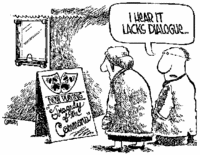 Interesting article here making a point that should have been obvious for
forty years.
When Garrett Hardin published his famous article about the
“tragedy of the commons”
in Science in December 1968,
he cited no evidence whatsoever for his assertion that a commons
would always be overgrazed; that community-owned resources would always
be mismanaged.
Quite a bit of evidence was already available, but he ignored it,
because it said quite the opposite:
villagers would band together to manage their commons,
including setting limits (stints) on how many animals any villager could
graze, and they would enforce those limits.
Interesting article here making a point that should have been obvious for
forty years.
When Garrett Hardin published his famous article about the
“tragedy of the commons”
in Science in December 1968,
he cited no evidence whatsoever for his assertion that a commons
would always be overgrazed; that community-owned resources would always
be mismanaged.
Quite a bit of evidence was already available, but he ignored it,
because it said quite the opposite:
villagers would band together to manage their commons,
including setting limits (stints) on how many animals any villager could
graze, and they would enforce those limits.
Finding evidence for Hardin’s thesis is much harder:
The only significant cases of overstocking found by the leading modern expert on the English commons involved wealthy landowners who deliberately put too many animals onto the pasture in order to weaken their much poorer neighbours’ position in disputes over the enclosure (privatisation) of common lands (Neeson 1993: 156).So privatization is not, as so many disciples of Hardin have argued, the cure for the non-existant tragedy of the commons. Rather, privatization can be the enemy of the common management of common resources.Hardin assumed that peasant farmers are unable to change their behaviour in the face of certain disaster. But in the real world, small farmers, fishers and others have created their own institutions and rules for preserving resources and ensuring that the commons community survived through good years and bad.
Debunking the `Tragedy of the Commons’, By Ian Angus, Links, International Journal of Socialist Renewal, August 24, 2008
What does this have to do with risk management? Well, insurance is the creation of a managed commons by pooling resources. Catastrophe bonds are another form of pooled resources, that is, a form of a commons.
On the Internet, the big problem with fighting risks like phishing, pharming, spam, and DDoS attacks is that the victims will fail if they go it alone. The Internet is a commons, and pretending that it isn’t is the problem. Most people and companies don’t abuse the Internet. But a few, such as spam herders and some extremist copyright holders (MPAA, RIAA), do. They need to be given stints by the village.
-jsq
Dunno if I can agree with you. Cod fisheries really did collapse because of commons issues, and other fisheries are collapsing today. The Sahara really was once a grassland before it was grazed down to nothing by nomadic herders. There are lakes and streams in China that are more pollutant than water. None of these are myths, all are instances of the tragedy of the commons.
If I hadn’t been reading about overfishing just a few days ago perhaps I would have let this slide, but I don’t think I can agree at all with the premise.
Solving for the Commons
So simple! BN > BE + C Aldo Cortesi channels Elinor Ostrom and summarizes what we need to fix Internet security by enticing the providers and users of the Internet to manage it as a commons. But first, some background….
Perry, the point was not that there *cannot* be tragedies of commons, rather that there *doesn’t have to be* a tragedy just because there’s a commons. I’m quite aware of the Sahara Forest, having seen its successor the Sahara Desert up close and personal while crossing it. But even there there are examples of local successful management of the commons, in tree planting projects that are holding back the advance of the sand and sometimes even reversing it.
I turns out someone else has thoroughly explored this subject, enough to win a Nobel Prize: Elinor Ostrom.
http://riskman.typepad.com/perilocity/2009/12/solving-for-the-commons.html